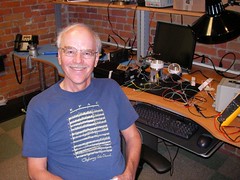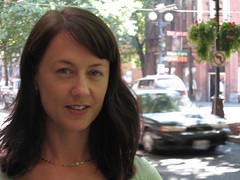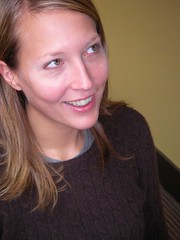I speak to Noah the day after it has been decided – by mutual consent it seems – that he is to leave Exbiblio in a week’s time. His view is that the parting is for the best. His primary interest is in User Experience, and he is trying to get away from his earlier career writing code (previous to his Master’s Degree in Technical Communication). Exbiblio would now like him to concentrate on coding. The split seems inevitable, although rather sudden, at least by my European standards. He leaves on what he calls “generous” terms.
Noah doesn’t believe that Exbiblio has a strongly implemented process for product development, and that as a result, his User Experience skills cannot be fully utilized. But first I ask him to explain what User Experience is all about.
“It’s partly Demographic. Who do we believe the audience is? How much money are they willing to spend? What are the comparable tools that they are using? What are the tasks the users are trying to achieve? What are the problems we are solving for them? This is at a different level from asking what features they want – they don’t know what the choices are – but they can tell you what they want to get done in life. They won’t say that they need a scanner pen – but you can watch them work and how they collect quotations from various papers and draw conclusions from those observations.”
At the next stage of development, he sees User Experience as being central to the creation of an effective product experience – its features, interface, and flow – based on the information that has been gathered.
“To do the second half well requires good research from the first phase, as well as knowledge of fields as diverse as graphic design and cognitive psychology. All of these aspects contribute to the creation of a superior product,” he says.
I press Noah a little (It should be remembered that the brief of this blog is total transparency) and he admits to some frustration with the Exbiblio approach to product development, and the way that it rapidly changes its mind about who the early adopters of its technology will be.
“It’s reached the point where if you were to ask most of the development team who is our main audience, they may or may not be able to tell you. It’s an issue if you don’t know who it’s for, because you don’t know what their needs are. It doesn’t make it impossible to make a successful product, but I think it makes it more difficult.”
He believes that if Exbiblio went through a different sort of design process – asking more questions about the users and their problems before throwing resources at product development – there would be a continuing role for him at the company.
For a different view, see the post on this blog by Claes-Fredrik Mannby For Love of Product
After completing his degree in Physics in 1995 at Reed College, Noah worked for a year at a small company in Portland, Universal Algorithms: “Actually, there were some interesting parallels between that company and Exbiblio. They had a brilliant founder with strong ideas about how to do business. In that case his direction ultimately led, in my opinion, to squandering some amazing IP and opportunities.”
He followed his intuition and left Universal Algorithms to join another local start-up, Quando, which was eventually bought by Infoseek and Disney. He moved with the company to its new headquarters in Seattle. He had spent his time at Quando – which has a highly specialised search technology – working as a coder, but he says that he had been very aware of design for a long time. This led him to take his Master’s Degree at the University of Washington, where his thesis was entitled Generation of Complex Diagrams: How to Make Lasagna Instead of Spaghetti.
He came across Exbiblio at a jobs fair earlier this year, and was attracted by the company’s vision, its technology, and its approach to business. He joined in April and is leaving with warm feelings about the company .
“It’s a remarkable work environment. People seem pleased to be here. The character of company, its way of doing business, treating employees well, treating partners well, its environmental awareness, and the sort of people it attracts – all of that is remarkable in these days when most companies focus on this quarter’s returns, short term gains and stock market price. But perhaps it’s a little too much vision- guided. Perhaps if it more focused on ensuring success, there might be a different approach to the process. ”
On another occasion, Martin King (Exbiblio’s founder), has told me that experience suggests that the average start-up will part with one in three of its hires. He says it’s the normal course of events, and that there is no shame in it for either party.
On the way to the airport, I give Martin a brief idea of what Noah has said and remind him that he has the right of reply. He has his own views on the problem that Exbiblio is trying to solve, and on how to go about creating a product. His views will surely work their way onto the blog by one route way or another, sooner or later.








